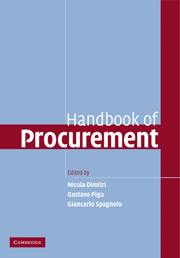Book contents
- Frontmatter
- Contents
- List of figures
- List of tables
- List of contributors
- Preface
- Part I Preliminary Issues
- 1 Introduction
- 2 The variety of procurement practice: evidence from public procurement
- Part II General Strategic Principles
- Part III Competitive Tendering Strategies
- Part IV Attracting and Screening Participants
- Part V Preventing Collusion and Corruption
- Part VI Dynamic Forces and Innovation
- Glossary
- Index
- References
2 - The variety of procurement practice: evidence from public procurement
Published online by Cambridge University Press: 04 November 2009
- Frontmatter
- Contents
- List of figures
- List of tables
- List of contributors
- Preface
- Part I Preliminary Issues
- 1 Introduction
- 2 The variety of procurement practice: evidence from public procurement
- Part II General Strategic Principles
- Part III Competitive Tendering Strategies
- Part IV Attracting and Screening Participants
- Part V Preventing Collusion and Corruption
- Part VI Dynamic Forces and Innovation
- Glossary
- Index
- References
Summary
Introduction
Efficient procurement practices, both private and public, play a key role in modern economies as they ensure reduction of wasteful activities. Achieving such efficiency is an ambitious task, as procurement faces numerous challenges, especially due to the market structure, the legal framework, and the political environment that procurers face.
Although reaching efficiency always implies experimenting with new methods and techniques of tendering, and although at a single point in time these might also vary depending on the level of development of institutions, market and the economic well-being of the given country, one should expect that procurement practices would tend to converge after controlling for all these factors.
Indeed, in recent years public and private procurement players have set up several initiatives and networks aimed at sharing best procurement practices. Some examples are the International Federation of Purchasing and Materials Management (IFPMM), the International Purchasing and Supply Education and Research Association (ISPERA), the Public Procurement Network (PPN) and the EU Public Procurement Learning Lab (EU Lab).
The EU Public Procurement Learning Lab (2003–2005)
The EU Public Procurement Learning Lab is an informal network among public procurement entities across Europe. The objective of the initiative is to exchange best practices and experiences in the field of public purchases and strengthen networking activities. The kick-off meeting took place in Rome in November 2003 and three working groups were created to develop the following topics: ‘Procurement and Small and Medium Enterprise’, ‘Technical Issues of Procurement’, ‘Competitive Tendering Design and Competitive Issues’. […]
- Type
- Chapter
- Information
- Handbook of Procurement , pp. 14 - 44Publisher: Cambridge University PressPrint publication year: 2006
References
- 14
- Cited by



